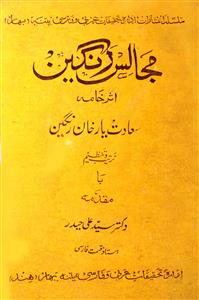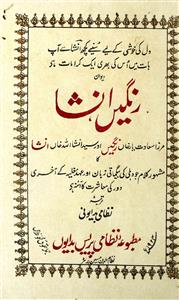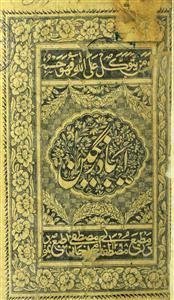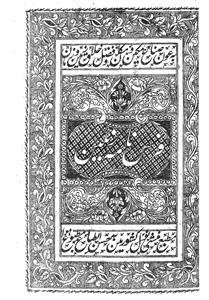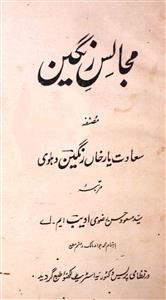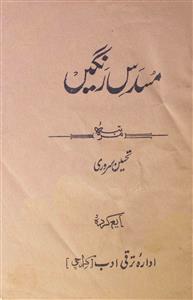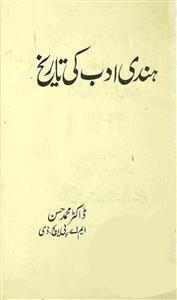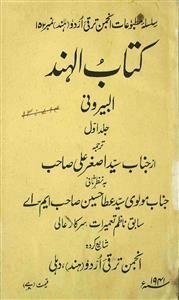 For any query/comment related to this ebook, please contact us at haidar.ali@rekhta.org
For any query/comment related to this ebook, please contact us at haidar.ali@rekhta.org
About The Book
"مجالس رنگین" سعادت یار خان رنگین کی لکھی ہوئی نہایت ہی اہم کتاب ہے۔ چونکہ رنگین ایک سیاح مزاج انسان تھے، انہوں نے مختلف شہروں کی سیر کی تھی، جہاں ہر قسم کے لوگوں سے ملاقاتیں ہوئیں تھیں جن میں شعرا بھی شامل تھے۔ "مجالس رنگین" میں انہیں شعرا کی مجالس اور صحبتوں کا بیان ہے۔ رنگین کو جہاں کہیں دو چار سخن فہم مل گئے اس قسم کی بے تکلف مجلسیں شروع ہوجاتی تھیں۔ ان میں اساتذہ اور نو مشق شعرا سبھی شامل ہوتے ہیں، فی البدیہ کلام کہتے تھے، مختلف صنائع و بدائع کے استعمال میں اپنی قدرت دکھاتے تھے، اساتذہ اور معاصرین کے کلام پر تنقید کی جاتی تھی گو کہ اس زمانہ میں صرف لفظی تنقید تھی۔ عام طور پر الفاظ کے انتخاب بندش اور قواعد عروض کی پابندی پر زیادہ زور دیا جاتا تھا۔ ان مجالس کے مطالعے سے اس عہد کے شاعرانہ مذاق اور تنقیدی معیار کا پورا اندازہ ہوجاتا ہے۔ زیر نظر نسخہ کو سید حیدر علی حیدر نے مرتب کیا ہے، موصوف فارسی کے استاد تھے، اسی لئے مقدمہ بھی فارسی میں لکھا ہے۔ مجالس کی تخریج کرتے ہوئے حواشی و تعلیقات کا بھی اضافہ کیا ہے۔
About The Author
Rangeen Saadat Yaar Khan was born in Sirhind. He was a brought up in Delhi and spent the major part of his life there. He was a sepoy by occupation and liked to travel. He had been in the service of many elites and especially that of Prince Suleman Shikoh. Later, he worked as an officer of artillery in Hyderabad. Later, he quit service and started horse-trading. Being a poet, his personality was full of contradictions. Sometimes he spoke as the founder of rekhti and sometimes he composed the Faras Nama. Sometimes we find him correcting the works of the doyens of literature to exhibit his expertise. However, his expertise lies in the fact that he retains his basic trait in all his writings. The words that he uses mesmerize the reader.
His association with the elites and the liaisons with the beauties of Lucknow led him towards rekhti and hazaliyaat. Rekhti is the feminine gender of rekhta and is a very interesting trait of literature and while composing this, a poet talks from a woman’s point of view. He has four deewans to his credit, these are, Rekhta, Baqiyaa, Aamekhta, and Angekhta. He writes like a romantic poet in his first two deewans. His choice of words is at times so high for a reader that it steals the poetical spark away. The third one is of Hazaliyaat that has a long poem that praises the Satan. Besides Bismillah it starts with Nauzobillah. Muslims consider it pious and auspicious to start every good work with Bismillah, while Naouzobillah is used to keep the Satan away. The fourth one is based on Rekhti. Besides, these deewans, he wrote five other books as well. The first one is Faras Nama that describes the breeds and cures of the illness of horses. The second one is Majalis-E-Rangeen. In this book, he incorporates corrections in the works of the experts of Urdu poetry. Rangeen Nama is the answer of Mehmuud Nama. The next one is a Masnavi, Dil Pazeer and according to Hasrat, it is better than all the masnawiees of his era. The story line and language are interesting and free of ambiguity. He was the disciple of Shah Hatim and of the age of Zoq. In his last days, he quit everything and would stay confined in his house. He died in
 For any query/comment related to this ebook, please contact us at haidar.ali@rekhta.org
For any query/comment related to this ebook, please contact us at haidar.ali@rekhta.org
